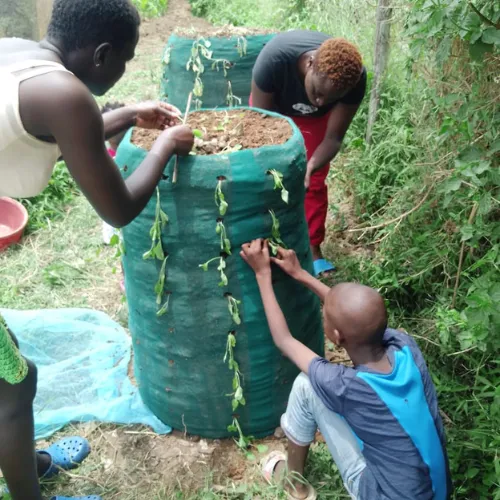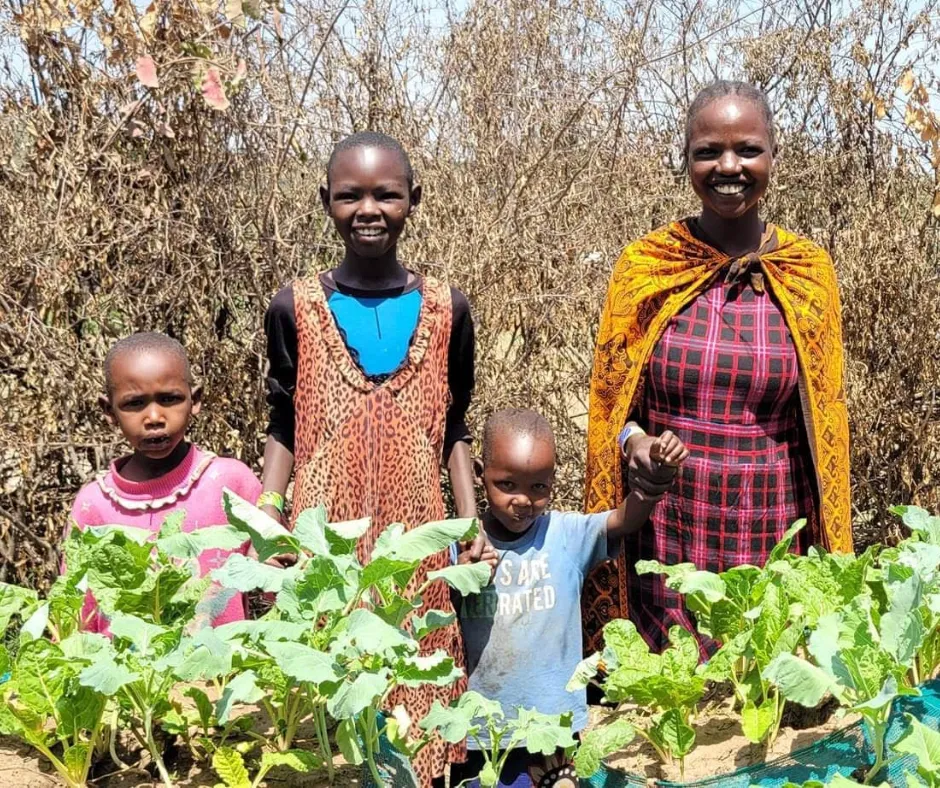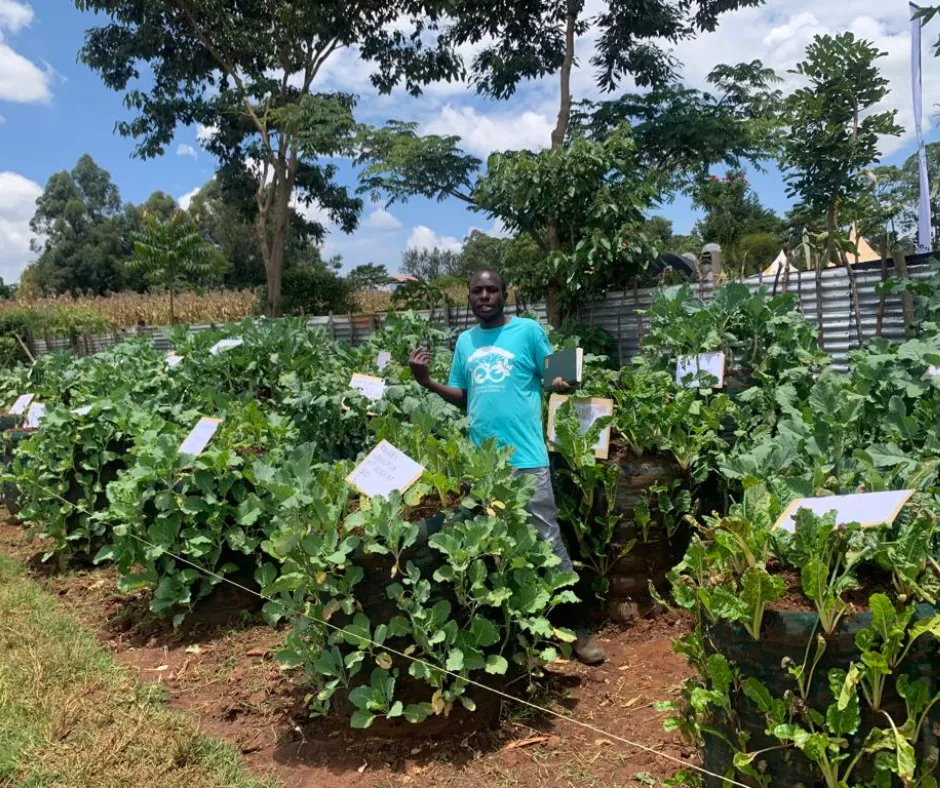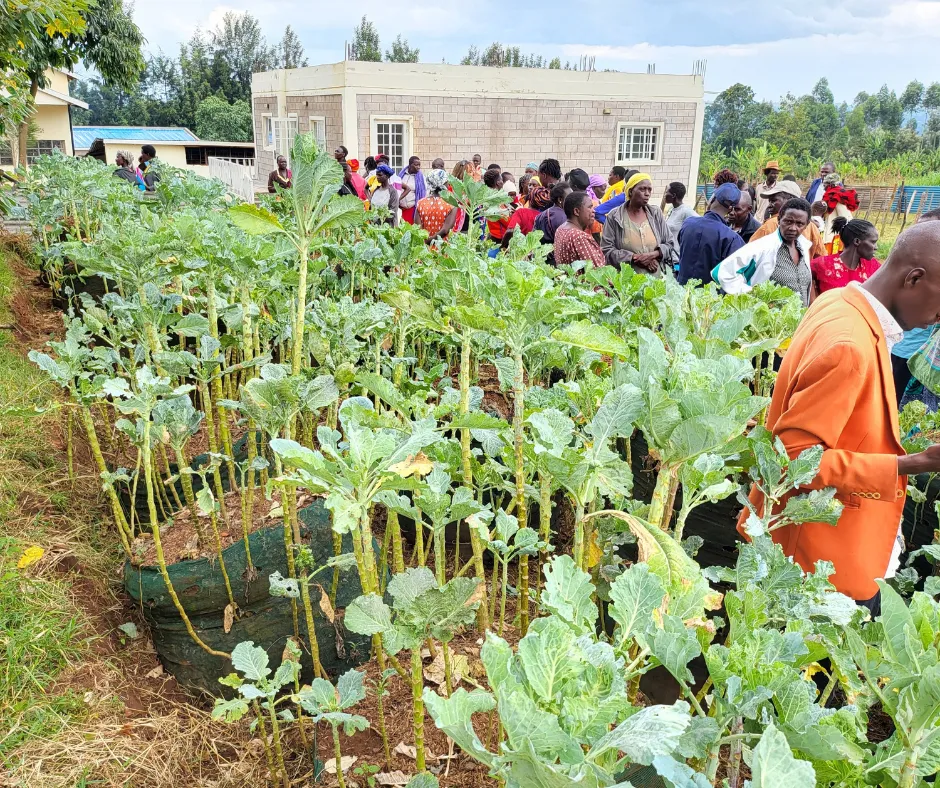The Garden Tower Project

Overview
The Garden Tower emerges as an innovative solution in the global fight against poverty. This ambitious initiative transcends borders and aims to combat food insecurity, malnutrition, and economic hardship worldwide.
Garden Towers revolutionize traditional farming by enabling vertical cultivation in 4-foot tall structures. This approach optimizes space and resources, significantly boosting agricultural production.
This innovation holds immense promise for impoverished regions. It empowers underserved communities to grow their own food, reducing dependence on external aid and mitigating land and weather constraints.
The impact is profound. Garden Towers offer universal access to fresh produce, tackling malnutrition and ensuring food security. As communities become self-sufficient in food production, resources can be redirected to education, healthcare, and other essential needs.
Garden Towers foster empowerment by involving communities in their sustenance. This empowerment generates resilience and hope, transcending poverty's boundaries.
Embracing Garden Towers promises to reshape the face of global poverty. It envisions a world where innovative solutions meet the needs of the underprivileged, breaking the cycle of poverty and uplifting communities through their efforts. Garden Towers invite us to work towards a brighter, more equitable future for all.
Garden Tower Facts:
Weekly meals provided: 3-8 meals of fresh vegetables
30% less water used than traditional in-ground gardens
Possible income generated from the sale of excess vegetables
4 ft tall by 3 ft in diameter
Can be built anywhere there is a flat surface


Objective
At 100 Humanitarians International, we are committed to collaborating with communities worldwide to drive transformative change.
Our vision is clear: we want every village and community, regardless of location, to have access to Garden Towers. These innovative structures represent not just sustenance but also a path to self-reliance and economic development.
Since 2018, we've provided over 22,000 Garden Towers to families in Kenya and Uganda, and an additional 30,000 through partner organizations. Now, we aim to expand our reach globally, sparking a ripple effect beyond food security. Garden Towers aren't just structures; they empower impoverished families to grow their own food and share surplus.
Our collaborative efforts aim to equip families with skills to break the cycle of poverty. With Garden Towers, we nurture self-reliance, turning the soil they tend into a source of sustenance and economic opportunities. Together, we'll sow transformation, empowering communities with self-sufficiency, resilience, and hope.
The Pilot Project
Our community engagement journey begins with an exciting pilot project, the first step in implementing Garden Towers. To make this innovative approach an integral part of local communities, we start by identifying a dedicated Community Director with strong connections and influence.
Here's what the pilot project involves:
1. Selecting Families:
We start by identifying ten families with some horticultural knowledge and a passion for farming. These families form the foundation for the Garden Towers initiative.
2. Providing Training:
We then provide comprehensive training to these selected families, using materials from 100 Humanitarians International. This education equips them with sustainable agriculture skills to optimize their Garden Towers.
3. Building Garden Towers:
With newfound knowledge, families construct two Garden Towers each, spaced six weeks apart to rotate crops efficiently. These towers are designed for seeds to grow on top before transplanting to the sides as they mature.
4. Monitoring Success:
We closely monitor the Garden Towers for potential challenges like pests or environmental issues. When issues arise, our community support system helps address them, fostering unity and shared responsibility among the participating families.
Our pilot project isn't just about planting seeds; it's about nurturing self-sufficiency, knowledge, and community spirit. It's a collaborative effort led by a Community Director, merging their vision with the families' aspirations for sustainable living.
Together, we're not just growing food; we're cultivating a brighter, more resilient future, one Garden Tower at a time.
Funding required for a Pilot Project in a New Community: $1000
- 20 Garden Towers ($400)
- Payment to the Community Director for Management ($300)
- Training materials ($50)
- Training and Mentoring from the 100 Humanitarians International Team ($250)
Funding needed after a Pilot Project: On-going based on the number of families who are ready to receive garden towers.
Execution Strategy & Timeline
The pilot project spans 90 days, forming the foundation for a lasting community relationship that goes beyond mere plant cultivation. Our mission during this period is to identify and engage more families interested in the Garden Tower program, expanding our green initiative.
1. Nurturing Interest:
We reach out to new families beyond the initial ten, connecting with those genuinely interested in joining the Garden Tower program. These families symbolize hope for a greener future.
2. Visionary Engagement:
Our Community Director plays a crucial role, inspiring these new families with a compelling vision and kindling enthusiasm. It's about aligning our goals, securing their commitment to abundant gardens and thriving communities.
3. Growing the Garden Tower Family:
Our goal as the pilot project concludes is to have 100 more families identified by the Community Director, ready to join our journey. Each family represents hope and sustainability.
4. Stewardship:
Our guiding principle is stewardship. Garden Towers are not handouts; they're a hand up. We see families as partners in our mission, built on trust, empowerment, and a shared commitment to nurturing abundance.
5. Assessing Readiness:
As the pilot project ends, we evaluate if the community is ready for the next step toward self-sufficiency. This decision is collaborative, ensuring they are equipped to continue tending their Garden Towers.
In essence, the pilot project sets the stage for a lasting partnership, sowing seeds of knowledge, community spirit, and self-sufficiency. Beyond 90 days, we envision a community where Garden Towers thrive, and each family becomes a steward of their tower of growth and abundance. This journey, built on trust, shared vision, and unwavering commitment, exemplifies the power of collaboration and sustainability.
Together, we grow stronger, one Garden Tower at a time.
Feedback & Reporting
We are committed to transparency and accountability. To keep our stakeholders informed about the Garden Tower program's evolution, we've established a structured reporting system. Monthly, we'll share updates on key metrics:
1. Progress Tracking: We'll track program growth and development, providing insights into its evolution from the start.
2. Impact Assessment: We'll highlight how many families benefit from the program, showcasing the real difference it makes.
3. Training Engagement: We'll share data on families attending our training sessions, reflecting our commitment to empowering them with agricultural skills.
4. Candid Feedback: We'll report feedback from participating families, using it to refine and improve the program.
Join Our Expeditions:
100 Humanitarians International conducts six annual expeditions to Kenya. These trips are not just visits; they are opportunities for sponsors and donors to connect with and mentor participating families in the Garden Tower program, witness the impact firsthand, and meet the beneficiaries. If this is something that would interest you, we are happy to make arrangements.




100 Humanitarians International is a 501(c)(3) nonprofit recognized by the IRS, and all donations to 100 Humanitarians International are tax-deductible in accordance with IRS regulations. EIN #82-1048388
South Jordan, Utah
801-432-0105
Cryptocurrency donations are accepted using Every.org, a 501(c)(3) nonprofit who processes and sells the cryptocurrency, sends the tax receipt, and disburses the full realized gain to 100 Humanitarians International.
More information here.
Social Media


